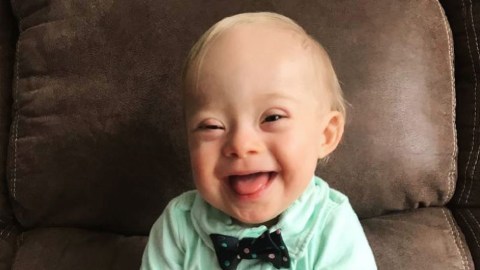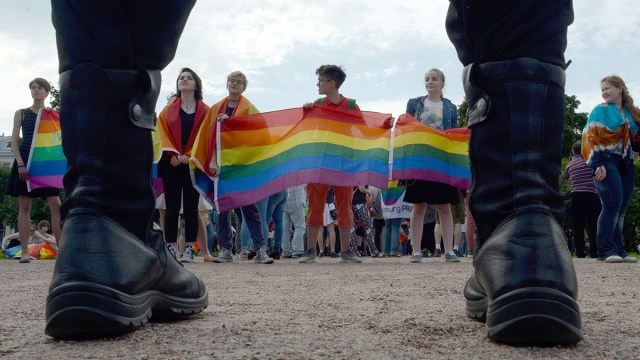For the first time in Gerber’s history, its “spokesbaby” is a boy with Down syndrome

The “Gerber Spokesbaby” for 2018 is one-year-old Lucas Warren, the first child with Down syndrome to win the contest.
“Lucas’ winning smile and joyful expression won our hearts this year, and we are all thrilled to name him our 2018 Spokesbaby,” Bill Partyka, president and CEO of Gerber, said in a statement. “Every year, we choose the baby who best exemplifies Gerber’s longstanding heritage of recognizing that every baby is a Gerber baby, and this year, Lucas is the perfect fit.”
More than 140,000 parents submitted photos of their babies for the contest, which began in 2010.
Meet the first Gerber baby with Down syndrome; his name is Lucas! https://t.co/RymRbTeVL9pic.twitter.com/vYiRLYeHAX
— TODAY (@TODAYshow) February 7, 2018
The Warrens will receive a $50,000 prize, which they plan to put toward Lucas’ education. Lucas will also be featured on Gerber’s socials media channels throughout the year.
“We’re hoping this will impact everyone—that it will shed a little bit of light on the special needs community and help more individuals with special needs be accepted and not limited,” Jason Warren told Today. “They have the potential to change the world, just like everybody else.”
Cortney Warren told Today that she’s happy Lucas won the contest, but that Lucas isn’t defined by his disability.
“He may have Down syndrome, but he’s always Lucas first,” she said. “He’s got an awesome personality, and he goes through the milestones of every child... We’re hoping when he grows up and looks back on this, he’ll be proud of himself and not ashamed of his disability.”
The news struck a positive note on social media, too.
“This is THE BEST!!! Some good things coming out of 2018 already,” wrote sarah_baptiste on Instagram.
One mother, who has a baby boy with Down syndrome, was overjoyed.
“In a puddle of tears over here…my mama heart is so so thankful…when Bodie was born I believed a lie, that others would not value him as much as I do. But, today is a new day. It is such a beautiful, good day,” wrote samanthajob on Instagram.
Down syndrome in the U.S.
One in 700 American babies is born with Down syndrome, totaling about 6,000 children each year. Any mother can give birth to a baby with the disorder, though her odds increase as she gets older. By age 45, the odds can be as high as 1 in 50.
In recent years, the increased availability of prenatal screening for Down syndrome seems to have resulted in fewer cases of the genetic disorder, which is to say that more parents have been choosing to terminate pregnancies when tests are positive. It is, no doubt, an incredibly sensitive and controversial issue, both for parents of children with Down syndrome and those who chose abortion.
In the U.S., the abortion rate for parents who receive a positive test is estimated to be 67 percent. In France, 77 percent. Denmark, 98 percent.
It’s perhaps the highest in Iceland, a country that only sees about one or two Down syndrome births each year. Icelandic law doesn’t require prenatal screening, but it does mandate that parents be informed of its availability. About 85 percent of parents choose to screen.
Some people think the testing prevents “suffering for the child and for the family.” Others, like Wesley J. Smith at the National Review, call it a “pogrom of eugenic abortion.”
A thorny question about Down syndrome in the media
An article by Evana Sandusky published on a health blog called The Mighty raises a thorny and possibly overlooked question about portrayals of Down syndrome in the media. In her piece, Sandusky wrote that she’s glad to see the media show positive examples of highly capable, highly presentable people with Down syndrome—children getting modeling contracts, or adults with Down syndrome giving public speeches.
But she wondered about the exclusion of other children with the disorder from the public eye, like her daughter, Jaycee, who has limited speech, won’t look at her mom long enough for her to snap a photo, and whose favorite thing to do in a store is to start impromptu races.
“Oh the joy of sprinting past bananas and wondering if your abandoned cart and purse will be there when you get back,” she wrote.
She essentially asked: Should only the most presentable of Down syndrome families be put forth as examples to the public? It’s a tough question, considering that there “may be unborn babies’ lives at stake when trying to give parents hope.”
Eventually, she decided that valuing people based solely on status, achievement, or special abilities can have dehumanizing effects.
“I believe we are the example people need to see and hear. Our family and extended family have embraced Jaycee. We fervently pray for her to live when she’s sick in the hospital. None of us can imagine life without her. Jaycee gives our family reasons to laugh, smile and feel loved. That is her extra-special ability.”





